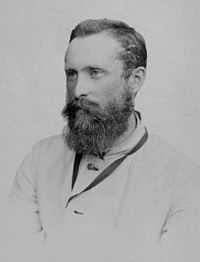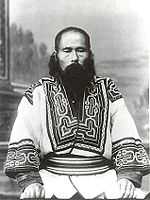Bronisław Piłsudski

Bronisław Piotr Piłsudski (2 November 1866, Żułów – 17 May 1918), brother of Józef Piłsudski, was a Polish cultural anthropologist who conducted outstanding research on the Ainu ethnic group, which then inhabited Sakhalin Island, but now live mostly on the Japanese island of Hokkaidō, with only a small minority left on Sakhalin.
Life
Bronisław and Józef Piłsudski lived in Vilnius in 1874, where they continued self-education for three years. After their mother's death in 1886, they left for Saint Petersburg. Bronisław Piłsudski passed an examination at a local university.
Bronisław, for his involvement with a socialist in a plot to assassinate Alexander III of Russia in 1887 together with Vladimir Lenin's brother Alexander Ulyanov, was sentenced to fifteen years at hard labor on Sakhalin island (Ulyanov was hanged). He used his time there to conduct research. While on Sakhalin in 1891, he met ethnographer Lev Sternberg. He was then sent to the southern part of the island. The rest of his prison sentence was changed to ten years of internal exile because he had settled without permission of the Russian authorities.
Three years later, he was given a grant by the Imperial Academy of Sciences to study the Ainu. That year he settled in an Ainu village, fell in love with an Ainu woman, Chufsanma, officially married her and had a son and daughter, Sukezo and Kiyo, with her. His wife was a niece of Chief Bafunkei of the village of Ai in Sakhalin. In 1903 he recorded the Ainu language. From these original recordings an Ainu dictionary of over a thousand words was made, which was translated into over ten languages. Piłsudski also wrote down the myths, culture, music and customs of the Ainu. He built an elementary schools in the village where he taught Russian language and mathematics to the local children. The schools were open only in winter, the slack season of the farm.
In 1904, the Russo-Japanese War broke out. Due to the rumour that if one spoke Russian he would be conscripted to the Russian Army, the locals began refusing to learn Russian. Also, Ainus were prepared to cooperate with the Japanese after they landed on Sakhalin. A local told Bronisław that he would not send his son to Bronisław's school. Chief Bafunkei told Piłsudski to return to Poland while the war continued. Piłsudski reluctantly agreed with him.
He moved to Japan by himself, where he was befriended by Ōkuma Shigenobu, Futabatei Shimei, Torii Ryūzō, Katayama Sen, and others, and helped an organisation of anti-imperial Russian refugees. Among them Futabatei Shimei became Bronisław's very close friend. He affectionately describes Bronisław as "an 'odd ball' who was so kind-hearted and innocent like a child that he would always insist in a very excited tone that he needed to do something to help Ainus and that it was his destiny to do that despite the fact that he was always a 'complete broke' then".
In the same year, he arrived in Kraków, Poland, after traveling from Japan via the United States. When there was upheaval preceding World War I, he escaped to Switzerland. In 1917 he left for Paris, where he worked at the Paris office of Polish National Committee, which had been founded by Roman Dmowski, the political archrival of Bronisław's younger brother Józef Piłsudski.
On 17 May 1918 he drowned in the Seine River near le Pont Neuf. On 21 May 1918 his body was found near le Pont Mirabeau. His death was thought to be a suicide.
All the descendants of his son and daughter live in Japan today as Japanese citizens. As Józef Piłsudski had daughters only, the direct paternal descendent of the entire Piłsudski Family is only Bronisław's, who lives in Yokohama.
See also
- List of Poles
- Polish Museum, Rapperswil
References
- "Piłsudski, Bronisław," Encyklopedia Powszechna PWN (PWN Universal Encyclopedia), Warsaw, Państwowe Wydawnictwo Naukowe, vol. 3, 1975, p. 521.
- "Piłsudski, Bronisław," Encyklopedia Polski (Encyclopedia of Poland), Kraków, Wydawnictwo Ryszard Kluszczyński, 1996, ISBN 83-86328-60-6, p. 505.
External links
|
